For the 2025 school year, there is 1 public charter school serving 410 students in Mount Pleasant Elementary School District. This district's average charter testing ranking is 5/10, which is in the bottom 50% of public charter schools in California.
Public Charter School in Mount Pleasant Elementary School District have an average math proficiency score of 28% (versus the California public charter school average of 31%), and reading proficiency score of 39% (versus the 48% statewide average).
Minority enrollment is 100% of the student body (majority Hispanic), which is more than the California public charter school average of 75% (majority Hispanic).
Overview
This School District
This State (CA)
# Schools
5 Schools
1,300 Schools
# Students
1,538 Students
711,386 Students
# Teachers
77 Teachers
31,388 Teachers
Student : Teacher Ratio
20:1
20:1
District Rank
Mount Pleasant Elementary School District, which is ranked #1242 of all 1,925 school districts in California (based off of combined math and reading proficiency testing data) for the 2021-2022 school year.
Overall District Rank
#1234 out of 1941 school districts
(Bottom 50%)
(Bottom 50%)
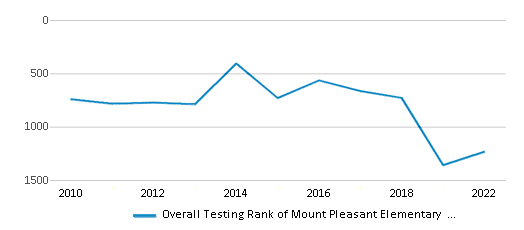
Math Test Scores (% Proficient)
22%
33%
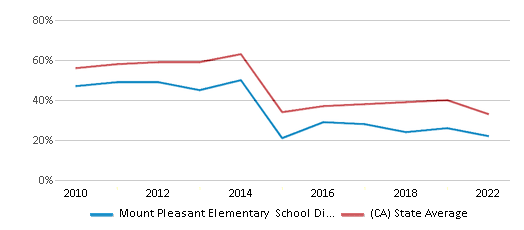
Reading/Language Arts Test Scores (% Proficient)
36%
47%
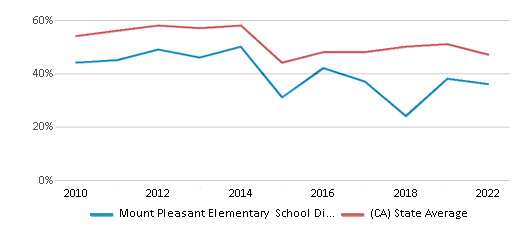
Science Test Scores (% Proficient)
23%
29%
Students by Ethnicity:
Diversity Score
0.40
0.65
# American Indian Students
3 Students
3,137 Students
% American Indian Students
n/a
1%
# Asian Students
219 Students
49,250 Students
% Asian Students
14%
7%
# Hispanic Students
1,175 Students
378,755 Students
% Hispanic Students
77%
53%
# Black Students
31 Students
48,500 Students
% Black Students
2%
7%
# White Students
33 Students
176,738 Students
% White Students
2%
25%
# Hawaiian Students
17 Students
2,385 Students
% Hawaiian Students
1%
n/a
# Two or more races Students
60 Students
48,230 Students
% of Two or more races Students
4%
7%
Students by Grade:
# Students in PK Grade:
-
83
# Students in K Grade:
216
60,517
# Students in 1st Grade:
150
46,070
# Students in 2nd Grade:
134
47,155
# Students in 3rd Grade:
166
46,520
# Students in 4th Grade:
148
46,583
# Students in 5th Grade:
185
46,919
# Students in 6th Grade:
190
54,274
# Students in 7th Grade:
184
57,837
# Students in 8th Grade:
165
57,970
# Students in 9th Grade:
-
70,272
# Students in 10th Grade:
-
64,790
# Students in 11th Grade:
-
57,670
# Students in 12th Grade:
-
54,726
# Ungraded Students:
-
-
District Revenue and Spending
The revenue/student of $54,776 is higher than the state median of $19,974. The school district revenue/student has grown by 25% over four school years.
The school district's spending/student of $52,529 is higher than the state median of $18,396. The school district spending/student has grown by 25% over four school years.
Total Revenue
$84 MM
$116,387 MM
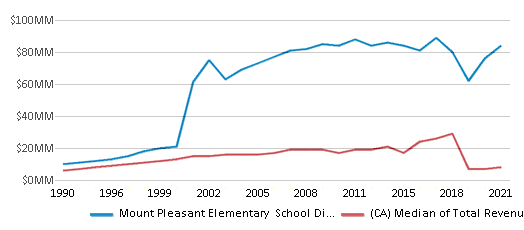
Spending
$81 MM
$107,188 MM
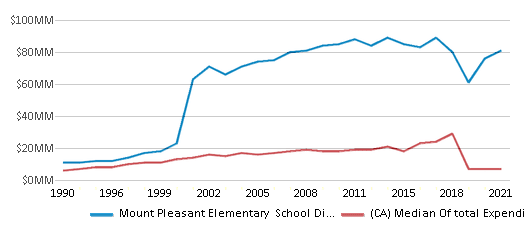
Revenue / Student
$54,776
$19,974
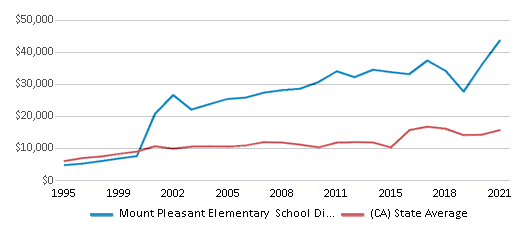
Spending / Student
$52,529
$18,396
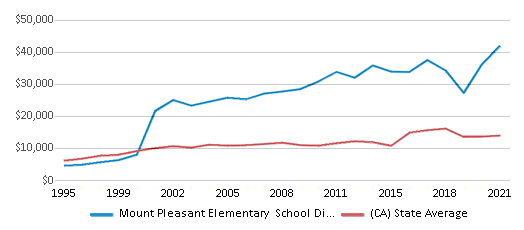
Best Mount Pleasant Elementary School District Public Charter Schools (2025)
School
(Math and Reading Proficiency)
(Math and Reading Proficiency)
Location
Grades
Students
Rank: #11.
Ida Jew Academies
Charter School
(Math: 28% | Reading: 39%)
Rank:
Rank:
5/
Bottom 50%10
1966 Flint Ave.
San Jose, CA 95148
(408) 223-3750
San Jose, CA 95148
(408) 223-3750
Grades: K-8
| 410 students
Recent Articles

What Is A Charter School?
Explore the world of charter schools in this comprehensive guide. Learn about their history, how they operate, and the pros and cons of this educational innovation. Discover key facts about charter schools, including admission policies, demographics, and funding, as well as what to look for when considering a charter school for your child.

10 Reasons Why High School Sports Benefit Students
Discover the 10 compelling reasons why high school sports are beneficial for students. This comprehensive article explores how athletics enhance academic performance, foster personal growth, and develop crucial life skills. From improved fitness and time management to leadership development and community representation, learn why participating in high school sports can be a game-changer for students' overall success and well-being.

February 05, 2025
Understanding the U.S. Department of Education: Structure, Impact, and EvolutionWe explore how the Department of Education shapes American education, from its cabinet-level leadership to its impact on millions of students, written for general audiences seeking clarity on this vital institution.





